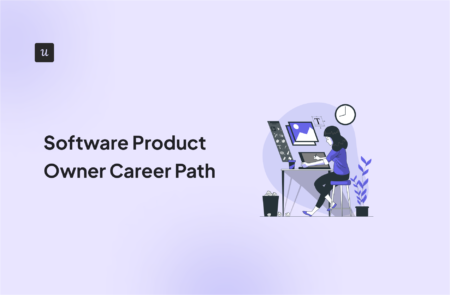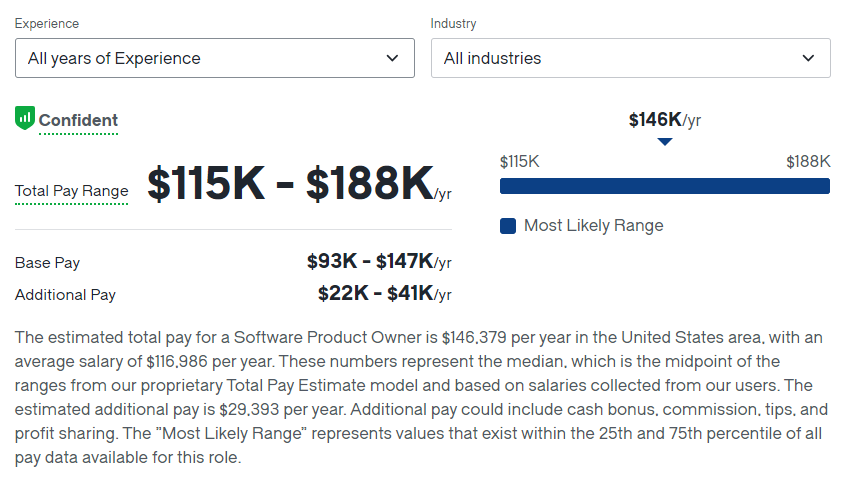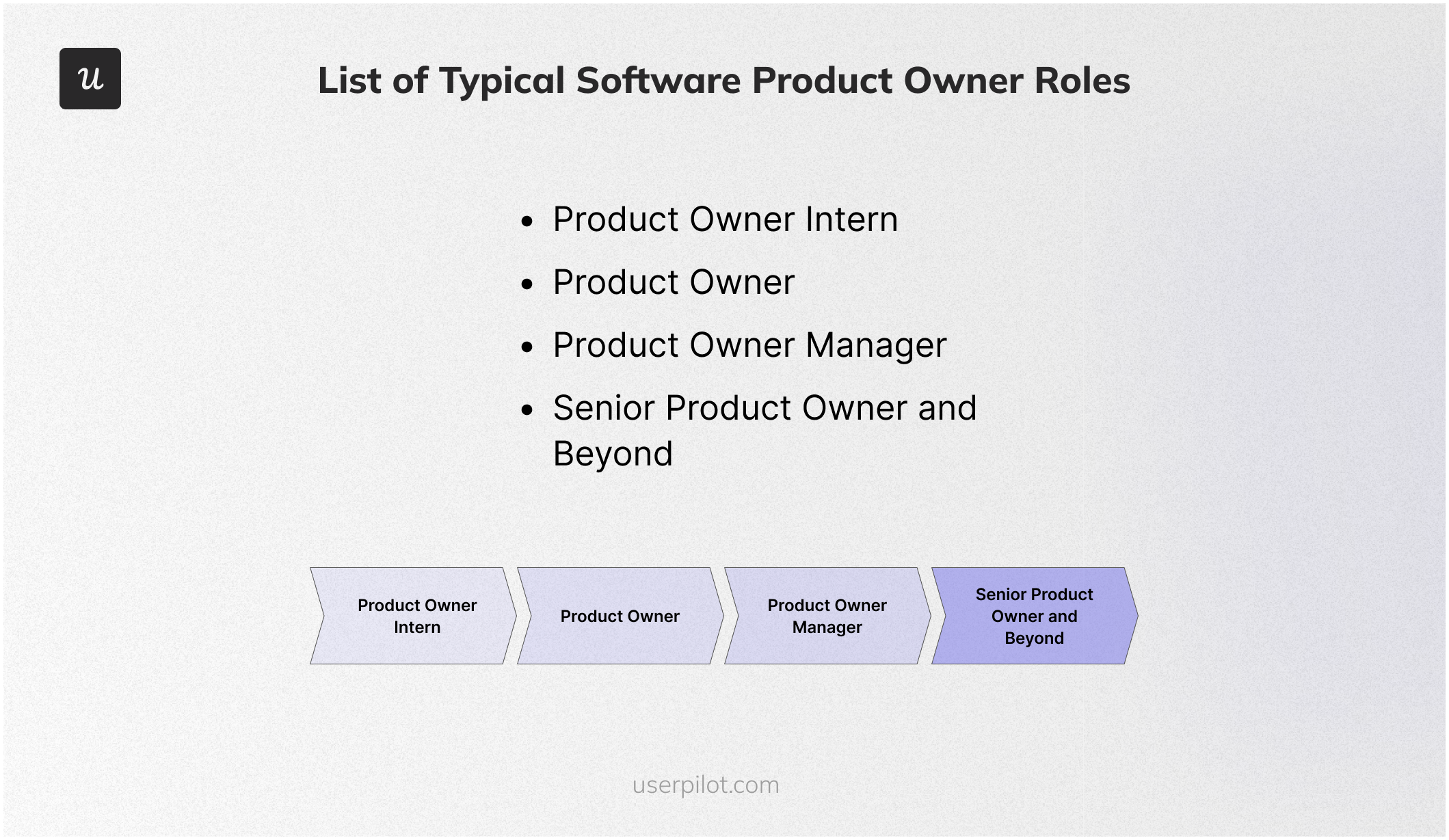
Try Userpilot Now
See Why 1,000+ Teams Choose Userpilot

What is a software product owner?
A software product owner is an IT professional tasked to prioritize features, create and maintain product backlog, and work with a Scrum team throughout the product development cycle.
They are responsible for delivering maximum value to give the end user an excellent experience. In the SaaS industry, they act as a link between stakeholders, development teams, and end users – ensuring the product meets business goals and specific user needs.
What does a software product owner do?
A software product owner defines and communicates a clear product aligned with the company’s strategic goals and market trends while striving to understand the customer’s pain points, industry demands, and competitive landscape to create a clear product success path.
They also prioritize features for continuous updates and user expectations by working closely with other teams.
Other tasks include managing potential product threats, determining the product’s growth paths, managing daily goals/schedules, and developing roadmaps to achieve excellent performance within project timelines.
Software product owner’s main responsibilities
A product owner is someone who manages and optimizes the product backlog to ensure its maximum value. They manage software development teams by correctly interpreting the product manager’s vision into actionable tasks.
Key responsibilities and duties of such a position include:
- Developing product goals and vision and communicating them to the team and stakeholders. This also includes developing and maintaining a strategic product roadmap with feature releases and milestones.
- Connecting with customers directly or indirectly by working with customer data to understand users’ needs to plan and prioritize the product backlog better. They analyze customer feedback, sales calls, user journeys, and other sources to understand customer needs better and increase product value.
- Defining user stories – a crucial concept in the Agile methodology that seeks to shift focus from product features to the needs of real people.
- Prioritize features and enhancements based on user feedback, market research, and business value.
- Collaborating closely with development teams, UX/UI designers, QA testers, and stakeholders to ensure successful product delivery. They conduct regular sprint planning, reviews, and retrospectives to optimize team performance and product quality.
- Conducting market research, competitive analysis, and trend monitoring to identify opportunities and threats in the SaaS landscape.
- Coordinating product launches, marketing campaigns, and go-to-market strategies in collaboration with marketing and sales teams. They also manage the product throughout its lifecycle, including feature enhancements, updates, and end-of-life planning as necessary.
Software product owner salary
The estimated total earnings for a software product owner is $146,379/year in the United States, according to Glassdoor, while the average salary is $116,986/year. Additional benefits like cash bonuses, commission, tips, and profit sharing can increase the numbers by $29,393/year.

One of the major factors influencing earning in this industry is the level of experience and position. According to Glassdoor, the average earnings are as follows:
- A product owner with 2 to 4 years experience earns about $136,690/year
- A product owner manager earns $153,502/year
- A senior product owner earns $161,097/year
- A principal product owner earns $203,284/year
Another factor affecting this earning is the industry. As reported by Glassdoor, the highest-paying industry in the United States for software product owners is Energy Mining and Utilities, with an average annual pay of $145,286.
The employer also determines how much one will earn. According to Glassdoor, here are some of the top-paying companies (average earnings per year):
- SunPower – $145,286/year
- NCR – 129,353/year
- Visteon – $124,369/year
- NanoString $157,062/year
- LiquidX – $120,634/year
- United Launch Alliance – $130,489/year
- Aptiv – $136,924/year
- Zoll Data Systems – $124,287/year
Where you live can also affect how much you make as a product owner. More and more companies are employing a geographically dispersed workforce (including remote workers). Thus, it’s common for companies to offer location-based salaries. Here are the salaries of some areas in the US:
- Santa Clara, CA – $136,194/year
- Federal Way, WA – $134,131/year
- Washington DC – $131,640/year
- San Francisco, CA – $131,640/year
- San Jose, CA – $128,406/year
- Marysville, WA – $128,279/year
- Tracy, CA – $127,249/year
- Sacramento, CA – $126,242/year
Software product owner career path
Here is how you can grow your career as a software product owner:
- Product owner intern: This level gives you foundational knowledge in Agile methodologies and product management principles.
- Product owner: At this level, you develop expertise in feature prioritization, backlog management, and user-centric product development.
- Product owner manager: This person leads a team of product owners, providing guidance, coaching, and performance management.
- Senior product owner and beyond: At this point, you can assume leadership roles in product strategy and vision, work closely with executive leadership to align product goals with business objectives, drive innovation and long-term product planning, and act as a thought leader in product management practices within the organization.
How to become a software product owner
An agile product owner role is extremely crucial for a product development team. The person in this position manages the product backlog to develop a shared understanding of problems and issues within the team.
But how does one become such an important part of the team? Read on below:
Acquire a bachelor’s degree
One must get a bachelor’s degree in computer science, IT, or a related field to work as a software product owner. Since it’s a highly technical role, the degree program must cover important topics like computer engineering, software design, and complex mathematics.
This program could take about 4 years to complete.
Join an internship
You will need at least two years of experience in project management to become a product owner. Most people use Agile, a unique approach to software development and project management.
Finish Scrum training
Scrum framework is a crucial tool for Agile product owners. Therefore, one must complete training with this framework.
You will go through a two-day course to be a Professional Scrum Product Owner (PSPO), which you can follow with the advanced two-day PSPO-A course from the Agile Academy that offers Certified Scrum Product Owner (CSPO) training and advanced A-CSPO training – each takes 14 hours online or 16 hours on-site.
Get certified
You will need to pursue three levels of Professional Scrum Product Owner certification through Scrum.org.
Completing 60-minute assessments will award you the PSPO I and PSPO II certifications, while the PSPO III certificate will require a 120-minute assessment. Another course of training lasting 14 hours online or 16 hours on-site will make you a Certified Scrum Professional – Product Owner.
Get connected in the Agile community
If you want to get entry-level job experience faster as a product owner, you must establish yourself well in the community. Participate in different programs within the community where you can find a mentor to help you grow.
Best resources for software product owners
Things become more challenging for a software product owner when you start working across several products and managing teams. This job requires more than gathering product insight, tracking the backlog, and reviewing product roadmap.
Thus, you need every resource available to help you cope with the pressure by learning more. Luckily, there are books, webinars, podcasts, and blogs that will help you out. Below, we have listed some of these resources:
Best books for software product owners
- The Professional Product Owner: Presenting a method of communicating desires, this book by Don McGreal and Ralph Jocham explains why taking accountability and focusing on value is crucial for a product owner.
- The Lean Startup: “Most startups fail. But many of those failures are preventable.” Eric Ries shares the best knowledge on how to start and succeed as a product owner.
- Product Mastery: From Good to Great Product Ownership: This book could be all you need to learn about Scrum. It explores the traits of the best product owners and how to succeed in the industry.
- Innovation Games: Creating Breakthrough Products Through Collaborative Play: How do you accurately predict what customers want, need, and will pay for? The solution is in Innovation Games, where Luke Hohmann shares 12 games that will get you there.
Best webinars for software product owners
Webinars can be another great source of insight for a software product owner. Here are some of the most useful ones:
Product Management Expertise & Prioritization:
- Userpilot Events focuses on product growth and user onboarding, which are critical aspects of successful software products. Their webinars can provide valuable insights on user experience optimization, feature adoption, and user engagement strategies – all directly impacting software product owner decisions.
- Product School remains a great resource, offering both free and paid webinars on topics like product strategy, user research, and user story prioritization, all crucial for software POs.
- Mind the Product is another strong source, frequently hosting webinars on product management best practices, including user story creation, backlog management, and building a product roadmap – essential skills for software POs.
- Roman Pichler is a thought leader in product management. He regularly hosts webinars and offers free resources on user story writing, backlog refinement, and product ownership best practices.
Deep Dives on Agile & Software Development:
- Scaled Agile Framework (SAFe): SAFe frequently hosts webinars on scaling Agile methodologies for software development. These webinars can be valuable for POs leading larger product teams.
- PMI (Project Management Institute): The PMI occasionally offers webinars on Agile project management practices. These webinars can help POs understand broader project management principles that complement Agile methodologies.
- Atlassian: As a major provider of Agile project management tools (Jira), Atlassian offers webinars on various Agile practices and best practices for using their tools for product management.
Best blogs for software product owners
Blogs are another incredible resource for the product community. Here are the top ones:
- Agile and Scrum Blog: This is a product owner blog with Agile coaching and training tools. It’s a wonderful place to start if you want to be a great product owner.
- Product Owner Blog: From the do’s and don’ts of being a great leader in product ownership to growth tips, the Product Owner Blog is a think-tank for passionate product people. It has been running since 2017 and has amazing materials in the industry.
- Product Bytes: Rich Minorov, a former product executive for big companies, writes, speaks, teaches, and consults on product management in this blog.
- ProductPlan Blog: This blog is packed with various articles on product strategy, roadmapping, and product management. It covers all the best areas of the industry.
- The Product Coalition: Do you wish to sink deeper into product management, product design, and product development? This is the blog to read. It has everything a beginner will need to develop their skills and knowledge.
Best podcasts for software product owners
You will also find the following podcasts quite insightful in your journey as a software product owner:
- Lenny’s Podcast with Lenny Rachitsky: His in-depth conversations speak especially to growth-oriented product owners, making Lenny one of the most loved individuals in this industry.
- The Product Manager Podcast By Hannah Clark: This made-in-house podcast presents interesting guests from all over the product realm, sharing different aspects of their work.
- The Product Podcast by Product School: Here is another podcast that brings you the best in the industry. You can engage with individuals from Google, Facebook, and other large companies to help you grow.
- Scrum.org Community Podcast: This podcast series features professional Scrum trainers and other individuals who share incredible insights.
Best tools for software product owners
Being an effective product owner is paramount to the success of any product. As the world of software development keeps expanding, one must master the right tools to enhance their productivity and effectiveness.
Here are tools that should ensure proper definition and prioritization of features, ensure effective communication, and maximize product value:
- Userpilot: An all-in-one product platform that comes with both engagement and analytics features that can empower product teams to create engaging, user-centric experiences while leveraging data-driven insights to continually refine and enhance their products
- Jira: Jira is one of the most common tools for product owners. It’s used for tracking development tasks and sprints, delivering in-depth reporting, and customizing workflows for teams.
- Trello: When it comes to flexibility and visually appealing project management tools, Trello stands out at the top. Product owners use it to organize tasks into boards, lists, and cards.
- Confluence: Confluence has become a crucial tool for product owners as a knowledge management and collaboration software. It’s used to document product requirements, share information, and facilitate team cohesiveness.
- Wrike: A centralized file management and communication hub is crucial when teams become more distributed. This is where Wrike comes in strong, for easy sharing of tasks, discussing them in real-time, and auto-assigning them.
- Google Charts: Google Charts is an excellent analytics tool that delivers valuable insights about product development, traffic sources, and conversion rates. It’s used to record data that helps product owners to make informed decisions.
Conclusion
We hope our article has given you a good overview of the career path for software product owners. Whether you’re just starting out or looking to advance, the key is to stay curious, keep learning, and remain open to new opportunities along the way.
Looking into tools for software product owners? Userpilot is an all-in-one product platform with engagement features and powerful analytics capabilities. Book a demo to see it in action!








